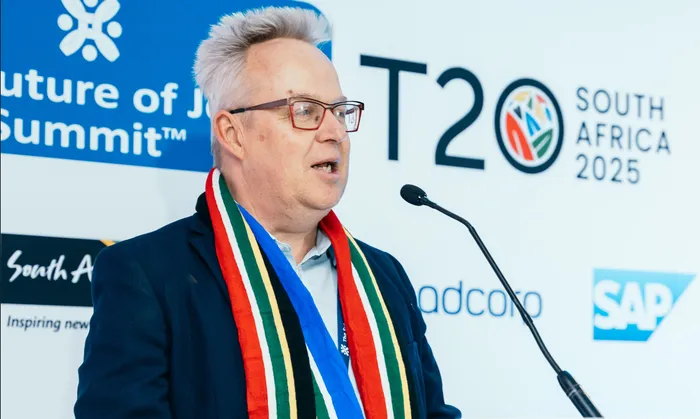Transformation as a competitive advantage: Business lessons from Siya Kolisi’s 100 Tests

Dr Nik Eberl is the Founder & Executive Chair: The Future of Jobs Summit™ (Official T20 Side Event) .He will be writing a regular column in Business Report.
Image: Supplied
When Siya Kolisi ran onto the field for his 100th Test, he carried more than a rugby ball. He carried the hopes of a nation — one that has struggled for decades to reconcile excellence with equity, history with hope. But this milestone wasn’t his alone. It was the shared triumph of a partnership that quietly rewrote what leadership looks like: Siya Kolisi and Rassie Erasmus.
One, a young man from Zwide township who learned to fight for every meal. The other, a maverick strategist from the Free State who saw genius where others saw risk. Together, they didn’t just win two World Cups. They showed that transformation — when done authentically — is not a buzzword. It’s a competitive advantage.
The Partnership Principle
Having worked with leaders across five continents through periods of transformation, I’ve seen a universal pattern: the most powerful partnerships aren’t between equals — they’re between believers.
When Erasmus took over the Springboks in 2018, the team was in disarray. Morale was low, public faith was fading, and unity was fragile. His decision to appoint Kolisi as captain was anything but safe. It was, in fact, one of the boldest leadership bets in modern sport: choosing potential over pedigree, authenticity over convention.
At the time, Kolisi wasn’t the obvious choice. He wasn’t the most capped player, the most vocal leader, or the most politically expedient appointment. But Erasmus saw something deeper — a leader who could unite through humility, not hierarchy. It was the kind of decision that defines great leadership: the courage to believe in someone before they believe fully in themselves.
The Unity Equation
South African Rugby Union President Mark Alexander called their partnership one that “transcends the field.” He’s right — but there’s an even greater truth beneath it.
When Siya lifted the Webb Ellis Cup in Yokohama in 2019, he wasn’t just making history as the first black captain to do so. He was proving that authentic leadership beats inherited authority every time.
Erasmus understood that you don’t build unity by preaching it. You build it by practicing it — in selection, in trust, and in the small, invisible decisions that signal who truly belongs. He didn’t ask the team to transform; he chose transformation. And by defending that decision when others doubted him, he demonstrated the kind of moral courage that every CEO, minister, and manager must learn if we are to rebuild the social fabric of this country.
Nation-building is not a speech. It’s a selection decision. It’s who you choose to back when the boardroom grows nervous.
The Courage to Choose Differently
Erasmus could have protected his reputation. He could have selected experience over experimentation, heritage over hunger. But leadership isn’t about playing it safe; it’s about choosing what’s right when it’s risky.
He rebuilt the Springboks from zero — new systems, new cultures, new definitions of what a South African team could represent. And in Kolisi, he found not a symbol, but a mirror — someone who embodied the country’s contradictions and its possibilities.
From a young boy who didn’t know if he’d eat tomorrow, to a man who now carries a nation’s hopes, Kolisi’s journey reflects what happens when vision meets opportunity. But that vision needed someone willing to see what others could not — someone like Erasmus.
Every organisation has its “Kolisis”: talented individuals from unexpected places whose lived experience could unite teams and shift culture. The question is — do we have enough “Rassies” willing to risk their comfort to elevate them?
Transformation as Strategy
In business and politics, the word “transformation” too often becomes procedural — a matter of compliance, not conviction. The Kolisi–Erasmus partnership reminds us that real transformation is a strategy. It brings new perspectives, unlocks hidden potential, and builds the kind of loyalty no pay cheque can buy.
When transformation is authentic, it becomes contagious. It fuels purpose, innovation, and performance. The Springboks’ resurgence wasn’t about quotas; it was about quality unlocked through inclusion. They didn’t win despite transformation. They won because of it.
That’s a lesson every board and executive team should heed. When you empower the overlooked, you redefine the possible.
The Leadership Question
So, ask yourself: in your organisation, who’s your Siya Kolisi? Who’s the person from an unexpected background, carrying not just talent but perspective — someone who could unite your culture in ways traditional leadership never could?
And more importantly — are you brave enough to be their Rassie? To stake your reputation on someone’s potential before it’s proven? Because that’s what real leadership looks like. It’s not managing certainty — it’s investing in possibility.
Beyond the Game
As South Africa looks to rebuild trust in its institutions, Kolisi’s 100th Test and Erasmus’s 50th match as coach are more than sporting milestones. They are leadership case studies. They remind us that progress happens not through perfect plans, but through courageous partnerships.
If we want to rebuild our economy, our companies, and our communities, we must do what they did: spot potential before it’s obvious, create unity through action, and choose leaders who represent the whole — not just the privileged few.
Transformation is not charity. It’s strategy. It’s how nations, teams, and businesses win — and keep winning. Siya and Rassie have already shown us the formula. The only question left is: who will be brave enough to apply it?
Dr Nik Eberl is the Founder & Executive Chair: The Future of Jobs Summit™ (Official T20 Side Event). He is also the author: Nation of Champions: How South Africa won the World Cup of Destination Branding.
*** The views expressed here do not necessarily represent those of Independent Media or IOL.
BUSINESS REPORT